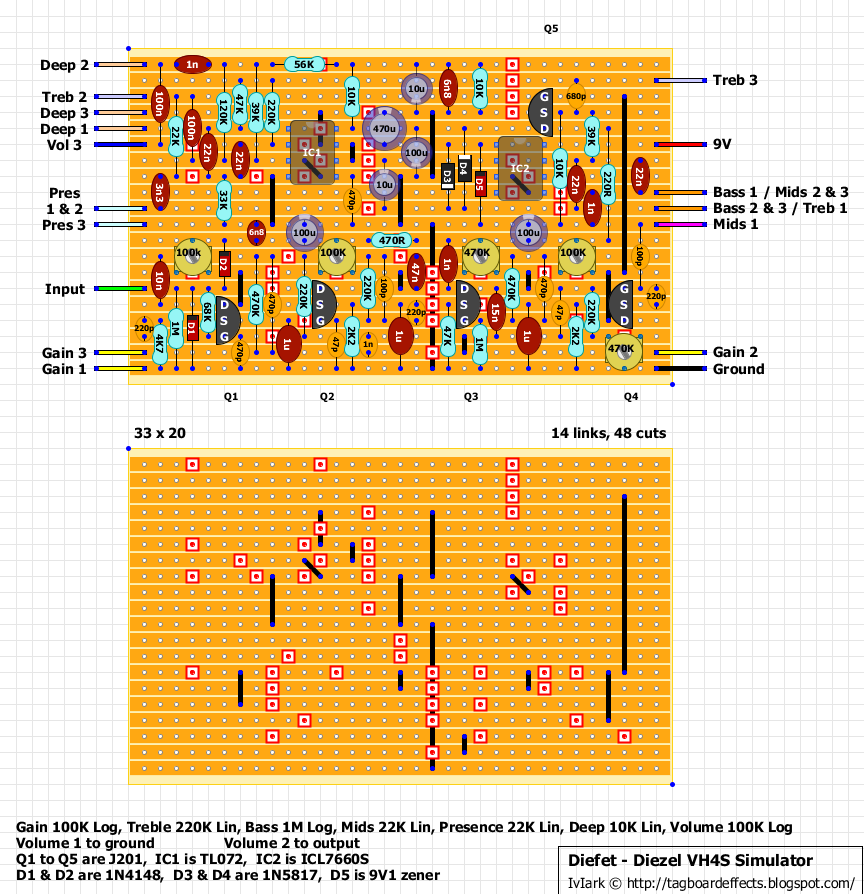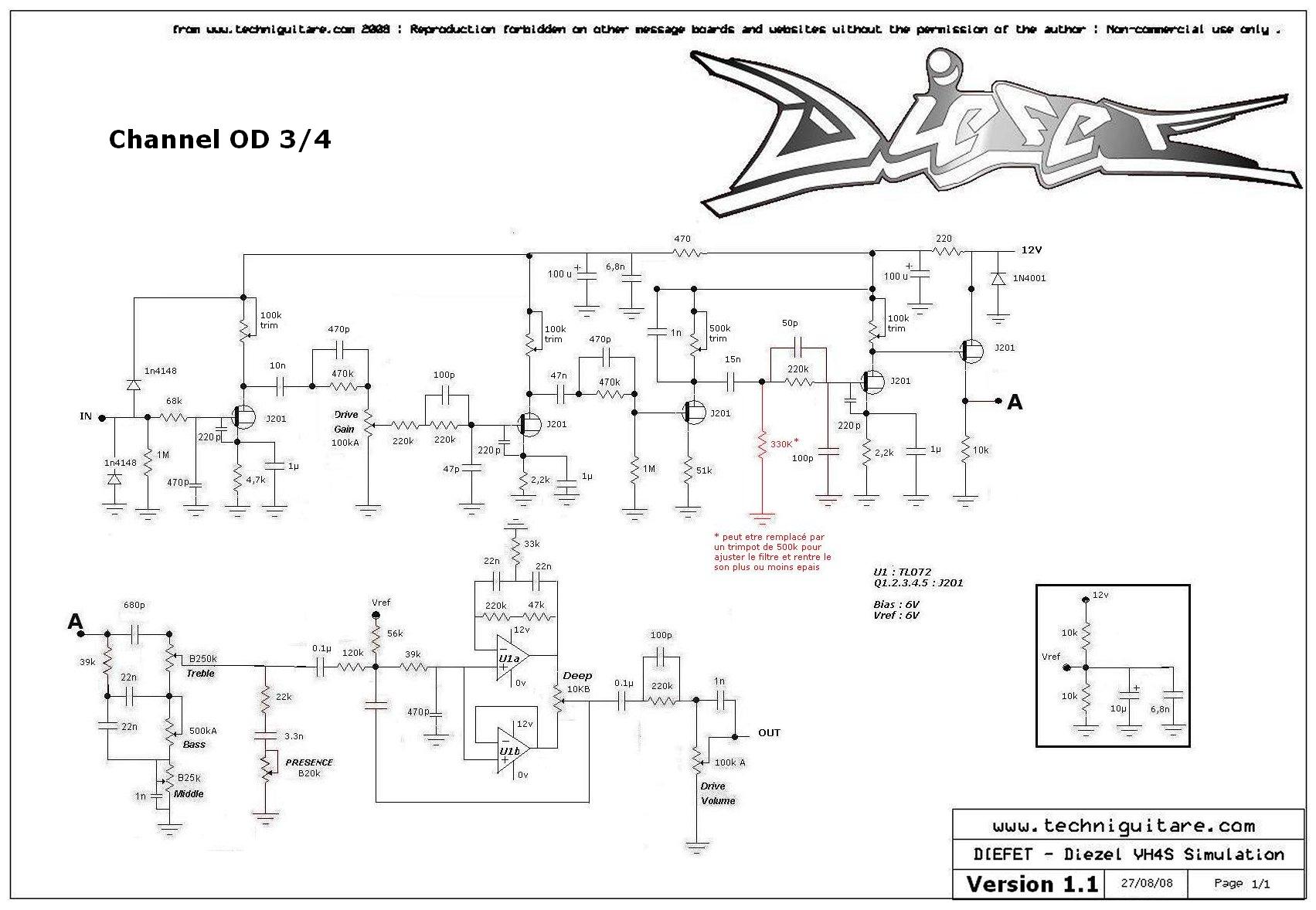Diesel Diefet - the quest: Weird tone stack response
Diesel Diefet - the quest: Weird tone stack response
|
This post was updated on .
The treble pot on this circuit reacts strangely, it seems to roll off far more lows than it adds highs, hence, it really sounds best completely off (making it useless). Surely there is a better way to make a treble pot.
I looked at Duncan - and it looks closest to the Marshall stack, but one difference, the mids here are 1n instead of 22n. The 22n (in Duncan) makes a lot more sense. If you plug in 1n the response is bad. Anyway - any thoughts here? especially from anyone who has built this beast? NOTE: I edited this to clear up some values, and to take out something I had said about pn4393s which seemed to be relevant before, but now not so much. So if you read it by email please re-read the part about the tone stack. Thanks.  |
|
You can substitute different jfets but be aware that because the Vp and Idss are quite different between the j201 and the pn4393, the gains will be different as well. This particular amp sim is basically a bunch of common source jfet stages in series with some post gain tone shaping. Using my jfet spreadsheet, with a j201, the first stage has a gain of about 27! (Using a pn4393 cuts this gain in half to about 15). There are two more stages after the gain control, so as you can imagine, it doesn't take long before the signal is clipped - a lot. When you hear a "farty" low end, my theory is that the bass frequencies are getting too much gain and are clipping. One way to control this is to reduce the source bypass cap values - the three 1 uF caps at the bottom of the layout. You could even eliminate them, but the that would reduce the gain/stage by a factor of four. What has worked for me in an experiment I did a while back is to remove the source bypass cap in the first stage only (in this case the 1 uF cap on bottom, left side). This reduces the gain going into the subsequent stages (where there is some tone shaping going on), and so the tendency to have a "farty" low end.
|
Re: Diesel Diefet - the quest: Weird tone stack response
|
The things I continue to learn still amaze me.
It is a new idea to me that too much gain would cause gating effect, but OK. I do know the circuit sounded smoother and did not gate with the PN4393s, and was louder. It also allowed me to get the perpetual sustain on certain notes when I did not get even close with j201s. Still, in general... while this particular circuit does seem to have a lot of overdrive sound - it doesn't have that much volume, no matter what you use. That seems somewhat counter-intuitive but it is true. The hard part is that everything is so interactive. This circuit is similar to Sabra Cadabra where even the guitar volume knob is interactive. With Diesel, when you lower the guitar volume it doesn't clean up at all, it just gets lower in volume until it sputters out. This oddest reaction seems to come in the TREBLE pot, as I described. The same thing happened to that pot when I tried an TL082 to replace the TL072 specified. So, I was think that maybe changing transistors in just the right gain stage might help, as you suggest. EDIT: sorry, I see that is not what you said, but I did think about swapping transistors, also, but I will try bypassing the 1uf on stage 1. |
|
The thing about "gain" is that once you have maxed out the gain available from the jfets, additional gain stages won't do you any good, except perhaps to give you more of a square wave sound. In any case, playing around with the source bypass caps should allow you to remove the "farty" sound from the bass frequencies. If you want to retain the mid-treble gain, try a 47 nF cap in place of the 1 uF cap in the first gain stage. If you use sockets, you can play around with this for all stages.
I'm not sure what is going on with your tone stack. It's a passive tone stack, so you can play around with the Duncan Tone Stack calculator to see if any mods will help. BTW, the 1 nF cap is a mid bypass cap - the rest looks similar to the Marshall tone stack (even the 22 nF caps - see the schematic below). I would just get rid of the 1 nF cap as an experiment. Good luck. I can say that it is often worth experimenting and modding these effects to suit your tastes. I did this with the Marshall Shredmaster and it's now a very nice distortion box for me. 
|
Re: Diesel Diefet - the quest: Weird tone stack response
|
I think I did leave another post about the tone stack - that it is close to the marshall except one exception, the mids call for a 1n while Marshall has a 22n.
So - I have had this working for quite awhile but have not been satisfied that I am getting all I can. I just restored the J201s and now it is sounding pretty decent but one thing I am noticing is that the way the pots connect seems to make a difference. A basic question - If you have lugs 2 & 3 jumpered on one pot, nd that is supposed to connect to another pot, for example Mids 2 & 3 to Bass 1. Does it matter whether which Mid lug ( 2 or 3 ) I take to bass 1? It seems to make a difference in practice. I just changed it from lug 3 t lug 2 (to bass 1) and it seems to work better. |
|
In reply to this post by motterpaul
A lot of amp emulators are like this, I guess the idea is to play through the clean channel on a ss amp and adjust the volume on the amp.
If it wasn't for this website I would definitely have a life.
|
Re: Diesel Diefet - the quest: Weird tone stack response
|
Okay - I think I finally have this sucker sorted out. I finally got rid of the gating sound on decay by carefully adjusting trimpot 3 (the 470k on the left) - once that was in the right place the rest were easy.
This is a hard one because many of the trimpots have ranges where you hear nothing, and you can get it working - but it may not sound great. This time, when I started with trim #3 FIRST. It sounded cleanest (no gating) and I was able to bring up the rest to compliment where it was set. I have never had such a hard time tuning in a FET circuit but I never had so many variables. This is a real good case where writing down the recommended voltages on each trim put would be highly recommended. Fixed resistors might even be a good idea. Still, I have a problem with the treble in that it merely rolls off all the lows and mids, leaving nothing bu a sad, lower-volume hissy sound when it is full on. It actually sounds best full off - by far. |
«
Return to Open Chat
|
1 view|%1 views
| Free forum by Nabble | Edit this page |

